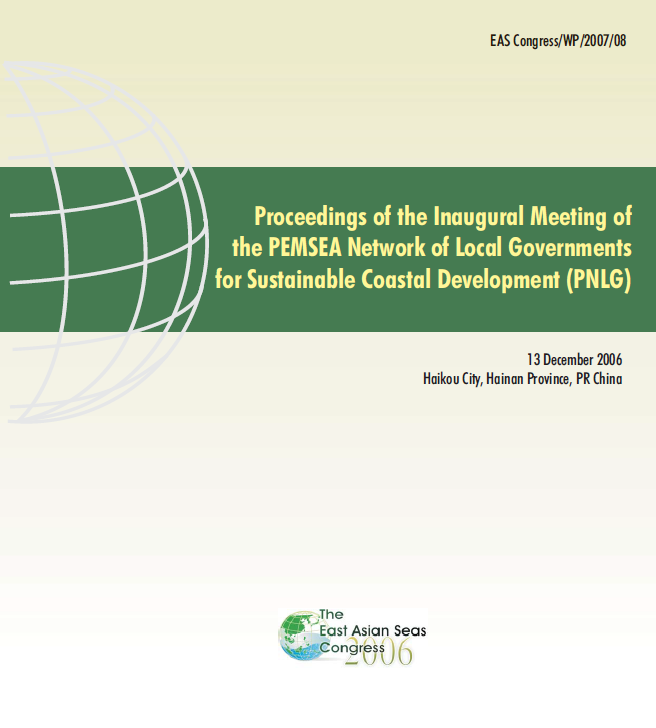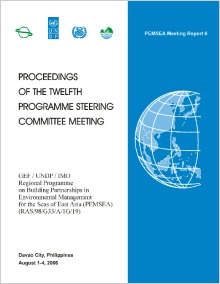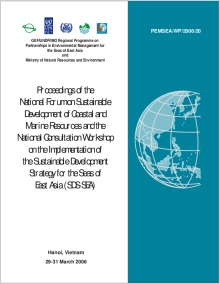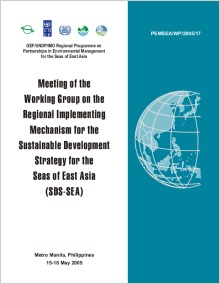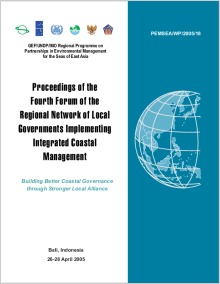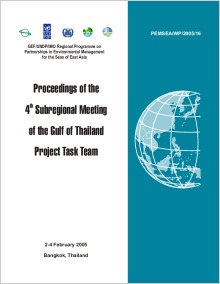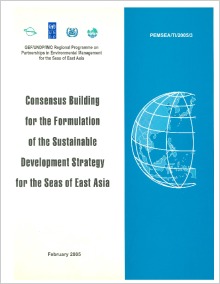
Breadcrumb
Proceedings of the Inaugural Meeting of the PNLG
PROCEEDINGS OF THE INAUGURAL MEETING OF THE PEMSEA NETWORK OF LOCAL GOVERNMENTS FOR SUSTAINABLE COASTAL DEVELOPMENT (PNLG)
East Asian Seas Congress 2006 Haikou
City, Hainan Province, PR China, 13 December 2006
1. INTRODUCTION
1.1. The Inaugural Meeting of the PEMSEA Network of Local Governments for Sustainable Coastal Development (PNLG) was held at the People’s Hall in Haikou City, Hainan Province, People’s Republic of China on 13 December 2006. The Meeting was organized in conjunction with the East Asian Seas Congress (EAS) 2006 and hosted by the State Oceanic Administration of PR China (SOA), Hainan Provincial Government and Haikou City Government.
1.2. The Meeting was attended by 130 delegates from 26 integrated coastal management (ICM) sites, namely Bali (includes the seven Regencies of Badung, Buleleng, Denpasar, Gianyar, Karangasem, Klungkung and Tabanan, and Sukabumi (Indonesia), Batangas, Bataan and Cavite (Philippines), Chonburi (Thailand), Danang and Quangnam (Vietnam), Nampho (Democratic People’s Republic of Korea), Port Klang (Malaysia), Shihwa (Republic of Korea), Sihanoukville (Cambodia), Xiamen and the 10 ICM parallel sites in PR China (Panjin, Leting, Dongying, Qingdao, Lianyungang, Quanzhou, Yangjiang, Fangchenggang, Haikou and Wenchang), as well as representatives from PEMSEA.
1.3. A full list of participants and the Meeting program are attached as Annex 1 and 2, respectively.
Proceedings of the Twelfth Programme Steering Committee Meeting
This publication summarizes the results of the Twelfth Programme Steering Committee (PSC) Meeting of the GEF/UNDP/IMO Regional Programme on Partnerships in Environmental Management for the Seas of East Asia (PEMSEA), held at the Waterfront Insular Hotel, Davao City, Philippines, from 1 to 4 August 2006. The Department of Environment and Natural Resources of the Philippines (DENR) hosted the Meeting. The 12th PSC Meeting marked the completion of an important milestone of the Regional Programme, presenting four major achievements over the past 12 years which include: a) The enhancement of coastal and ocean governance in the region; b) The development and adoption of the Sustainable Development Strategy for the Seas of East Asia (SDS-SEA) as the region’s common framework for coastal and ocean management; c) The forging of a partnership arrangement between and among various stakeholders in the region; and d) The strengthening of efforts in on-the-ground implementation of activities related to environmental management and integrated coastal management (ICM). These successes provided impetus for the development of regional mechanisms for the implementation of the SDS-SEA and for the transformation of PEMSEA into the PEMSEA Resource Facility (PRF). The Meeting was attended by delegates from PEMSEA participating countries namely: Cambodia, Democratic People’s Republic of Korea, Indonesia, Japan, Malaysia, People’s Republic of China, Philippines, Republic of Korea, Singapore, Thailand and Vietnam. A country representative from Lao PDR also participated in the Meeting.
Proceedings of the National Forum on Sustainable Development of Coastal and Marine Resources and the National Consultation Workshop on the Implementation of the Sustainable Development Strategy for the Seas of East Asia (SDS-SEA)
The National Forum on Sustainable Development of Coastal and Marine Resources and the National Consultation Workshop on the Implementation of the Sustainable Development Strategy for the Seas of East Asia (SDS-SEA) was held in Hanoi, Vietnam, on 29-31 March 2006. The National Forum was held to assess issues on the marine and coastal environment; to provide a forum for stocktaking of coastal management initiatives and achievements in Vietnam, and to identify priority needs, concerns and requirements of the stakeholders in sustainable coastal and marine development. The program of activities consisted of three major sessions, i.e., the national state of the coast reporting, stocktaking of integrated coastal management (ICM) related initiatives in Vietnam and national implementation of the SDS-SEA. The forum was attended by about 90 participants representing several central and local government agencies including provincial Department of Natural Resources and Environment (DONRE) offices; academic and research institutions; international non-government organizations (NGOs), and the media.
Proceedings of the Eleventh Programme Steering Committee Meeting
This publication summarizes the results of the Eleventh Programme Steering Committee (PSC) Meeting of the GEF/UNDP/IMO Regional Programme on Partnerships in Environmental Management for the Seas of East Asia (PEMSEA), held at the Apsara Angkor Hotel, Siem Reap, Cambodia, from 1 to 4 August 2005. The Ministry of Environment of Cambodia (MoE) hosted the Meeting. The 11th PSC Meeting was a special tripartite meeting of the participating governments, the implementing and executing agencies during the second phase of PEMSEA. The primary purpose of the meeting was to discuss amongst others, three major issues: a)to deliberate on the operational arrangements for the implementation of the Sustainable Development Strategy for the Seas of East Asia or SDS-SEA, focusing on the draft Partnership Agreement and Partnership Operating Arrangements; b)to discuss the transformation of the current project-based operation into a programme-based arrangement, as well as the transformation of the current Regional Programme Office to a self-sustained PEMSEA Resource Facility (PRF); and c)to identify the necessary strategies for transition and closure of the current activities. The Meeting was attended by delegates from participating countries namely, Cambodia, Indonesia, Japan, Malaysia, People’s Republic of China, Philippines, Republic of Korea, Singapore, Thailand and Vietnam. Representatives from the Lao PDR, Myanmar, and Timor-Leste also participated in the Meeting.
Proceedings of the Workshop on Ecosystem-based Management of Interrelated River Basins, Estuaries and Coastal Seas
The Workshop on Ecosystem-Based Management of Interrelated River Basins, Estuaries and Coastal Seas was held at Hotel Riviera, Masan, Republic of Korea, from 01 to 03 June 2005. The workshop was co-organized by PEMSEA and the Ministry of Maritime Affairs and Fisheries (MOMAF) of RO Korea. The workshop aimed to identify major challenges to ecosystem-based management of interrelated river basins, estuaries and coastal seas; review Proceedings of the Workshop on Ecosystem-Based Management of Interrelated River Basins, Estuaries and Coastal Seas experiences and lessons learned from the practices; and outline response strategies and mode of implementation for the Seas of East Asia region. The workshop was attended by experts and professionals from the People’s Republic of China, Japan, Indonesia, Philippines, Republic of Korea, Wetlands International Malaysia, NOWPAP and PEMSEA Regional Programme Office. Representatives from local NGOs, media, academe, environmental groups and other institutions in RO Korea were also involved.
Meeting of the Working Group on the Regional Implementing Mechanism for the Sustainable Development Strategy for the Seas of East Asia (SDS-SEA)
The Meeting, held from 16-18 May 2005 in Metro Manila, Philippines, was convened to formulate the PEMSEA Partnership Agreement and the Partnership Operating Arrangements on the transformation of PEMSEA into a self-sustaining regional implementing mechanism for the SDS-SEA.
Proceedings of the Fourth Forum of the Regional Network of Local Governments Implementing Integrated Coastal Management : Building Better Coastal Governance through Stronger Local Alliance (Bali, Indonesia : 26-28 April 2005)
The Fourth Forum of the Regional Network of Local Governments (RNLG) implementing Integrated Coastal Management or ICM was organized by the GEF/UNDP/IMO Regional Programme for Partnerships in Environmental Management for the Seas of East Asia (PEMSEA), jointly with the Ministry of Environment of Indonesia, and hosted by the Bali Provincial Government of Indonesia. The RNLG Forum was held at the INNA Grand Bali Beach Hotel in Denpasar, Bali, Indonesia, on 26 – 28 April 2005. The Forum was designed on the theme of “Building Better Coastal Governance through Stronger Local Alliance”, aiming at consolidating lessons learned from ICM implementation, formulating strategies for sustaining ICM practices, and transforming the existing regional network of local governments into a self-sustaining, local government-driven one. Special focus was also given to the issue of coastal hazard management. Strategies for enhancing local capacity and institutional framework as well as raising public awareness for effectively addressing coastal hazards were identified within the context of ICM. Ninety-five participants from ten countries of the East Asian Seas region as well as two countries outside of the Region and UNEP/GPA, attended the Forum.
Proceedings of the 4th Subregional Meeting of the Gulf of Thailand Project Task Team
The 4th Subregional Meeting of the Gulf of Thailand Project Task Team was held at the Montien Riverside Hotel, Bangkok, Thailand, from 2 to 4 February 2005. The Marine Department, Ministry of Transportation, Royal Government of Thailand hosted the Meeting. The PEMSEA Gulf of Thailand (GOT) project aims to build capacity in combating sea-based sources of marine pollution, particularly in promoting the partnership among the countries of the subregion in oil spill preparedness and response. Building on the progress made since the 3rd Subregional Project Task Team (PTT) Meeting in July 2004, this Meeting was expected to provide guidance to further strengthen project implementation, with special focus on the development of a multilateral cooperative framework in oil spill preparedness and response in the subregion. The Meeting was attended by delegates from Cambodia, Thailand and Vietnam, observers from East Asia Response Pte Ltd (EARL), ECOTHAI Consultants Co. Ltd (ECOTHAI) and Oil Industry Environment Safety Group (IESG), and PEMSEA RPO staff.
Consensus Building for the Formulation of the Sustainable Development Strategy for the Seas of East Asia
On 12 December 2003, the Seas of East Asia region adopted a common framework for the environmental management and protection of its shared seas. The historic event was capped by ceremonial signing of the Ministerial Declaration on Regional Cooperation on the Sustainable Development of the Seas of East Asia by the honorable ministers and officials from PEMSEA countries—Brunei, Cambodia, China, Democratic People’s Republic of Korea, Indonesia, Japan, Malaysia, Philippines, Republic of Korea, Singapore, Thailand and Vietnam—before a gathering of distinguished guests from various governments, research institutions and international organizations. The Declaration embodies the commitment of the countries to adhere to and implement the Sustainable Development Strategy for the Seas of East Asia (SDS-SEA), which formally brings together national and stakeholder efforts under a collaborative platform for partnerships to implement commitments made under international agreements pertaining to coasts and oceans, including the recommendations from the World Summit for Sustainable Development (WSSD), Millennium Development Goals (MDG) and Agenda 21. This paper revisits the approaches and processes undertaken to generate the regional consensus needed to develop the SDS-SEA. Working on existing information documents, it chronicles the outcomes of several consultations conducted, particularly during the 1st Senior Government Officials’ Meeting and the 9th Programme Steering Committee in Pattaya, Thailand, the final national review by PEMSEA countries and the feedback from various stakeholders on the SDS-SEA.
